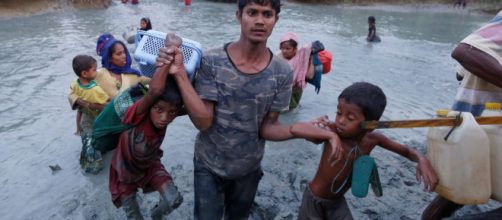Today, the Bangladeshi and Burmese authorities have announced that they have finalised details for repatriating hundreds of thousands of persecuted Rohingya to Myanmar. This repatriation timeframe decided amongst the two nations comes after months of negotiations, which commenced in November 2017.
Too little too late?
After increasing violence targeted towards the Rohingya by the Myanmar security forces peaked last year, this sparked a mass exodus to neighbouring Bangladesh.
Amnesty International has described the case as “a vicious system of state-sponsored, institutionalised discrimination that amounts of apartheid”.
The reached agreement states that Myanmar will accept 1,500 Rohingya every week, with the aim of having all of them returned to Myanmar within two years. It is believed there are nearly 1 million Rohingya currently living in Bangladesh.
Life for the Rohingya in Bangladesh is less violent but equally as problematic, with a lack of any formal refugee status and their rights to work being heavily restricted.
There are currently a further 500,000 Rohingya living in Saudi Arabia, 350,000 fled to Pakistan and 40,000 to neighbouring India.
International backlash to the agreement
The international community has raised concerns about the repatriation agreement. The UN High Commission for Refugees stated that the underlying causes of the crisis needed to be addressed before the Rohingya feel is it safe for them to return.
Meanwhile, in the UK, members of the Commons Select Committee for International Development have drawn up a report, voicing their “grave concern” about the return of the Rohingya people to Myanmar.
The report which was published on 15 January 2018 is damning, stating that the UK’s position had been overly optimistic about Myanmar’s levels of democracy. It also states that the UK had been slow to act in condemnation of this treatment which has amounted to a “textbook example of ethnic cleansing”.
The UK Government has put forward a five-point plan for Rohingya and Burma, stating that the required conditions for the safe return of Rohingya must include access to fundamental human rights. Ministers from the Department for International Development (DfID) believe these conditions are “a long way from being met”.
So far the UK Government has provided £59 million for the response to the Rohingya crisis.
Who are the Rohingya?
The Rohingya are a minority ethnic group who practice Islam and have lived for centuries in the Buddhist country of Myanmar.
Myanmar is made up of 135 officially recognised ethnic groups. However, the Rohingya are not one of them, having been routinely denied citizenship in Myanmar since 1982. This officially renders the minority group ‘stateless’.
Before the crisis, it was believed that 1.1 million Rohingya lived in Myanmar, predominantly in the Rakhine State.
Although widespread persecution of the Rohingya has taken place since the late 1970s, the violence that broke out last year has sparked mass migration and a Humanitarian Crisis.
There have been horrific reports of the military carrying out indiscriminate killings, rape and arson against Rohingya villages.
The civilian leader of Myanmar and former Nobel prize winner Aung San Suu Kyi has faced international criticism for the way she has handled the violence.
Her silence and reluctance to avoid discussions about the treatment of the Rohingya people has been met with condemnation, with recent speculation she may face genocide charges in the future.


